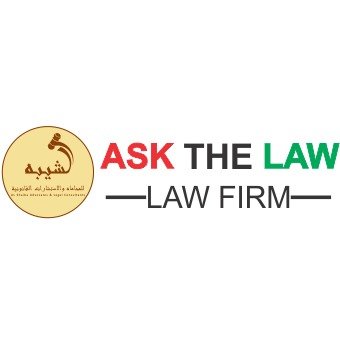Best Will & Testament Lawyers in United Arab Emirates
Share your needs with us, get contacted by law firms.
Free. Takes 2 min.
Or refine your search by selecting a city:
List of the best lawyers in United Arab Emirates

The Black Robe For Legal Consultancy & Debit Collection
1 hour Free ConsultationAbout Will & Testament Law in United Arab Emirates
In the United Arab Emirates (UAE), Will & Testament law is governed by a mix of Sharia law for Muslim residents and expatriates, and local laws for non-Muslim expatriates. The UAE jurisdiction allows individuals to determine the distribution of their estates through legal instruments such as Wills. Notably, specific Free Zones like the DIFC and ADGM have their own set of regulations and courts that provide options for Will registration, particularly catering to the needs of expatriates.
Why You May Need a Lawyer
Creating a Will can be a complex process, especially in a region where local nuances in law can significantly affect the distribution of assets. Common situations where legal assistance might be essential include:
- Ensuring compliance with both Sharia and local laws for Muslim residents.
- Drafting and registering a Will in Free Zones or other jurisdictions within the UAE.
- Handling disputes among heirs or beneficiaries.
- Understanding tax implications and liability management.
- Managing multi-jurisdictional assets and ensuring their orderly distribution.
Local Laws Overview
The UAE's legal landscape regarding Wills is diverse and influenced both by Islamic Sharia law and civil provisions for expatriates. Key aspects include:
- Sharia Law: For Muslims, the distribution of the estate is heavily influenced by Sharia, dictating specific shares to family members.
- Non-Muslim Expatriates: Can opt to register a Will in legal registries like DIFC or ADGM, which allows flexibility in asset distribution.
- Federal Laws: Recent amendments have provided expatriates with more leeway in estate planning.
- Probate Process: Includes verification of the Will, valuation of assets, settlement of debts, and distribution among heirs.
Frequently Asked Questions
1. Can a non-Muslim expatriate in UAE make a Will?
Yes, non-Muslim expatriates can create Wills according to their preferences and register them with the DIFC, ADGM, or through local Dubai courts.
2. What happens if someone dies without a Will in the UAE?
In the absence of a Will, Sharia law may dictate the inheritance process, even for non-Muslims, potentially leading to outcomes not aligned with the deceased's wishes.
3. Are Wills prepared in other countries valid in the UAE?
Wills made abroad may require additional validation processes and might not override Sharia law unless recognized by local UAE jurisdictions.
4. Is there an inheritance tax in the UAE?
No, the UAE does not impose an inheritance tax on the transfer of estate to beneficiaries.
5. Can a Will in the UAE cover assets in multiple countries?
Yes, Wills can be structured to include assets in different jurisdictions, but legal advice is crucial to ensure they are recognized globally.
6. What is the process for validating a Will in Dubai?
A Will needs to be registered with the appropriate jurisdiction and typically involves court validation, especially if disputes arise.
7. Can a Muslim resident choose how to distribute their estate?
Muslim residents are bound by Sharia, which specifies fixed shares for certain family members, limiting personal choices in asset distribution.
8. What documents are required to draft a Will in the UAE?
Identification documents, proof of assets, and details of beneficiaries are typically required to draft a legally binding Will.
9. How can I update a Will in the UAE?
Wills can be updated at any time through legal mechanisms provided by the registration authorities, but must be revalidated and registered.
10. Are digital Wills recognized in the UAE?
Currently, digital Wills are not legally recognized and must be physically documented and registered to be valid.
Additional Resources
For further information and assistance, consult the following resources:
- The Dubai Courts and Abu Dhabi Judicial Department offer registration services for Wills.
- The DIFC Wills Service Center provides specialized Will registration for non-Muslims.
- ADGM Courts offer guidance and resources for estate planning in their jurisdiction.
- Visit government portals and law firms specializing in UAE estate law for comprehensive insights.
Next Steps
If you require legal assistance with Will & Testament issues in the UAE, consider taking the following steps:
- Seek a consultation with a lawyer specializing in Wills and estate planning within the UAE.
- List all assets and document your wishes for distribution to simplify the drafting process.
- Consider attending legal seminars or workshops on estate planning available through local law firms or community centers.
- Contact relevant authorities for guidance on registering your Will appropriately.
Lawzana helps you find the best lawyers and law firms in United Arab Emirates through a curated and pre-screened list of qualified legal professionals. Our platform offers rankings and detailed profiles of attorneys and law firms, allowing you to compare based on practice areas, including Will & Testament, experience, and client feedback.
Each profile includes a description of the firm's areas of practice, client reviews, team members and partners, year of establishment, spoken languages, office locations, contact information, social media presence, and any published articles or resources. Most firms on our platform speak English and are experienced in both local and international legal matters.
Get a quote from top-rated law firms in United Arab Emirates — quickly, securely, and without unnecessary hassle.
Disclaimer:
The information provided on this page is for general informational purposes only and does not constitute legal advice. While we strive to ensure the accuracy and relevance of the content, legal information may change over time, and interpretations of the law can vary. You should always consult with a qualified legal professional for advice specific to your situation.
We disclaim all liability for actions taken or not taken based on the content of this page. If you believe any information is incorrect or outdated, please contact us, and we will review and update it where appropriate.
Browse will & testament law firms by city in United Arab Emirates
Refine your search by selecting a city.
















